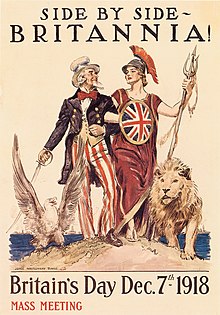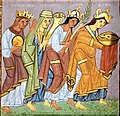National personification


Anational personificationis ananthropomorphicpersonificationof a state or the people(s) it inhabits. It may appear inpolitical cartoonsandpropaganda.
Some personifications in the Western world often took theLatinname of the ancientRoman province.Examples of this type includeBritannia,Germania,Hibernia,Hispania,HelvetiaandPolonia.
Examples of personifications of theGoddess of LibertyincludeMarianne,theStatue of Liberty(Liberty Enlightening the World), and many examples of United States coinage. Another ancient model wasRoma,a femaledeitywho personified the city ofRomeand his dominion over the territories of theRoman Empire.[1]
Examples of representations of theeverymanor citizenry in addition to the nation itself areDeutscher Michel,John BullandUncle Sam.[2]
Gallery
[edit]-
Iudaea Capta,"JudaeaTaken ", commemorative coin issued by theRoman emperorVespasian(left) after theJewish War
-
The allegoricalpersonification of Italyin a painting byPhilipp Veit,which was realized between 1834 and 1836.
-
In this Allegory depicting the 1576Pacification of GhentbyAdriaen Pietersz van de Venne,the seated women represent a short-lived unity among the embattled provinces of what would become the present-day Belgium and Netherlands
-
1909 cartoon inPuckshows (clockwise) US, Germany, Britain, France and Japan engaged in naval race in a "no limit" game.
-
Columbia depicted in anAmerican Committee for Relief in the Near Eastposter defending an Armenian woman beneath her flag.
Personifications by country or territory
[edit]See also
[edit]- Afghanis-tan,a manga originally published as awebcomicabout Central Asia with personified countries.
- Polandball,a contemporary form of national personification in which countries are drawnby Internet usersas stereotypic balls andsharedascomicsononline communities.
- Hetalia,amangaandanimeabout personified countries interacting.
- Mural crown
- National animal,often personifies a nation in cartoons.
- National emblem,for other metaphors for nations.
- National god,a deity that embodies a nation.
- National patron saint,a Saint that is regarded as the heavenly advocate of a nation.
References
[edit]- ^"Il Tempio di Venere e Roma"(in Italian).Retrieved12 September2023.
- ^Eric Hobsbawm, "Mass-Producing Traditions: Europe, 1870-1914," in Eric Hobsbawm and Terence Ranger, eds.,The Invention of Tradition(Cambridge, 1983), 263-307.
- ^Ahmed, Salahuddin (2004).Bangladesh: Past and Present.APH Publishing. p. 310.ISBN8176484695.RetrievedJuly 11,2012.
- ^"NATIONAL SYMBOLS".Bangladesh Tourism Board.Bangladesh: Ministry of Civil Aviation & Tourism. Archived fromthe originalon 2016-12-28.Retrieved2015-09-10.
- ^Couvreur, Manuel; Deknop, Anne; Symons, Thérèse (2005).Manneken-Pis: Dans tous ses états.Historia Bruxellae (in French). Vol. 9. Brussels: Musées de la Ville de Bruxelles.ISBN978-2-930423-01-2.
- ^Emerson, Catherine (2015).Regarding Manneken Pis: Culture, Celebration and Conflict in Brussels.Leeds: Taylor & Francis Ltd.ISBN978-1-909662-30-8.
- ^"20th SEA Games 1999".2001-03-02. Archived fromthe originalon 2001-03-02.Retrieved2024-06-20.
- ^"Berita 2021c - Rekaan baju 'Dang Budiwati' imbau zaman gemilang Sukan SEA NBD".www.pelitabrunei.gov.bn.Retrieved2024-06-20.
- ^McGill, Robert (2017).War Is Here: The Vietnam War and Canadian Literature.McGill-Queen's Press. p. 37.ISBN9780773551589.Retrieved17 May2019.
- ^Barber, Katherine (2007).Only in Canada You Say: A Treasury of Canadian Language.Oxford University Press Canada. p.70.ISBN9780195427073.
- ^Légaré, André (2008)."Inuit identity and regionalization in the Canadian Central and Eastern Arctic: a survey of writings about Nunavut".Polar Geography.31(3–4): 99–118.Bibcode:2008PolGe..31...99L.doi:10.1080/10889370701742845.Retrieved2024-08-04.
- ^"Library and Archives Canada".Library and Archives Canada.
- ^"CHILE: 50 AÑOS DEL GOLPE. EL ÁNGEL DE LA LIBERTAD".Rascacielos. September 2023.Retrieved15 June2024.
- ^"Võng dân vi thập ma hội bả trung quốc xưng vi" thỏ tử ""[Why do Internet called China a "hare"?].The Paper(in Chinese). 1 August 2015.Retrieved8 October2021.
- ^Hassanabadi, Mahmoud."Rostam: A Complex Puzzle: A New Approach to the Identification of the Character of Rostam in the Iranian National Epos Shāhnāme".
- ^Dallmayr, Fred (25 August 1999).Border Crossings: Toward a Comparative Political Theory.Lexington Books.ISBN9780739152546.
- ^Heck, Isabel."Le mythe de Siyâvosh: rapports entre l'épopée nationale de ferdowsi et des récits populaires en Iran (The myth of Siyâvosh: relationships between the national epic of Ferdowsi and popular stories in Iran)"(PDF)(in French).Retrieved2024-02-08.
- ^O'Rourke Murphy, M. & MacKillop, J. (2006).An Irish Literature Reader: Poetry, Prose, Drama.
- ^"Discovering What's the National Animal of Ireland: A Cultural Emblem Revealed".3 February 2024.Retrieved2024-04-24.
- ^Minahan, James B. (2009).The Complete Guide to National Symbols and Emblems.ABC-CLIO.p. 436.ISBN9780313344978.
- ^Blashfield, Jean F. (2009).Italy.Scholastic. p. 33.ISBN9780531120996.
- ^""Saint Mark", Franciscan Media ".Archived fromthe originalon 8 October 2020.Retrieved30 July2018.
- ^Liok Ee Tan (1988).The Rhetoric of Bangsa and Minzu.Monash Asia Institute. p. 14.ISBN978-0-86746-909-7.
- ^Melanie Chew (1999).The Presidential Notes: A biography of President Yusof bin Ishak.Singapore: SNP Publications. p. 78.ISBN978-981-4032-48-3.
- ^Minahan, James B. (2009).The Complete Guide to National Symbols and Emblems.Greenwood. p. 101.ISBN978-0313344961.
- ^Subba, Sanghamitra (29 January 2020)."Love it or hate it, it's abominable".
- ^Phillips, Jock."South African War memorial, Waimate".
- ^Dingwall, R. "Southern Man (Dunedin Airport)",Otago Sculpture Trust, 19 November 2011. Retrieved 14 July 2017.
- ^A Manifesto from the Provisional Government of Macedonia,1881,
Our mother Macedonia became now as a widow, lonely and deserted by her sons. She does not fly the banner of the victorious Macedonian army
- ^Bulgarian graphic representation of Bulgaria, East Rumelia and North Macedonia
- ^"Kunstschatten: Mama Sranan - Parbode Magazine".Archived fromthe originalon 2016-04-14.Retrieved2016-03-30.
- ^Valance, Marc. (Baden, 2013)Die Schweizer Kuh. Kult und Vermarktung eines nationalen Symbols,p. 6 ff.
- ^"John Bull, symbol of the English and Englishness".Historic UK.Retrieved16 August2024.
- ^"Britannia and Liberty: Behind the Design".Royal Mint.Retrieved6 August2024.
Further reading
[edit]- Lionel Gossman."Making of a Romantic Icon: The Religious Context of Friedrich Overbeck's 'Italia und Germania.'" American Philosophical Society, 2007.ISBN0-87169-975-3.[1]






















































































